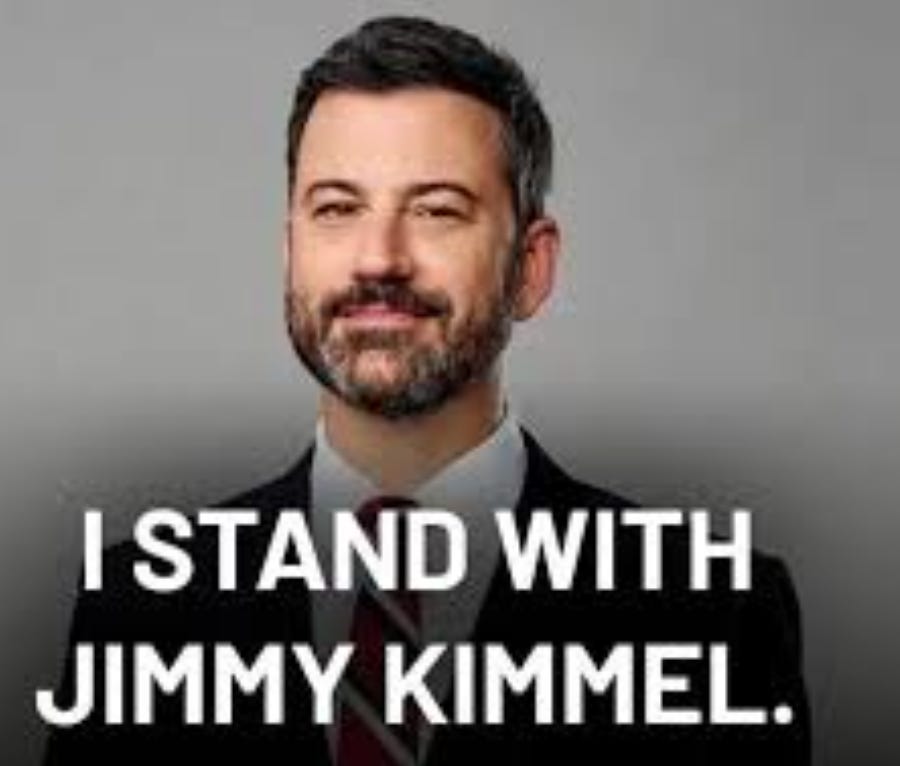Is it Fair to Punish a Local TV Station and Its Sponsors for a Decision They Didn't Make?
A corporate decision made in a Texas boardroom has placed Vermont businesses in an impossible position.
When Vermont viewers tuned in to WVNY (ABC 22) on September 23, 2025, they didn’t see Jimmy Kimmel Live!. Instead, the late-night slot was filled with alternate programming. This was not a choice made by producers in Colchester, where the station operates. The call came from Nexstar Media Group, a Texas-based company that manages WVNY under a contract with Mission Broadcasting, which holds the FCC license.
According to Reuters, Nexstar and Sinclair Broadcasting, two of the largest television station groups in the country, ordered more than 70 ABC affiliates not to resume airing Kimmel’s show after his suspension was lifted. Together, these decisions affected roughly 23 percent of U.S. households.
Why Was the Show Pulled?
The controversy stems from comments host Jimmy Kimmel made about conservative activist Charlie Kirk’s death. Disney, ABC’s parent company, suspended Kimmel for six days, then reinstated him. Nexstar and Sinclair, however, announced they would not carry the program going forward.
According to Business Insider, Nexstar said its decision was made “in line with community standards” and framed as an exercise of local editorial judgment. FCC Chair Brendan Carr supported that reasoning, saying affiliates have the right to preempt network content when it conflicts with local values.
Fallout in Vermont
Even though the decision originated outside Vermont, the fallout is being felt locally. WVNY’s viewers quickly took to social media with frustration, some calling the move censorship and others urging boycotts.
Posts circulated online listed local advertisers on WVNY, encouraging people to “stop shopping at their businesses.” One commenter wrote, “Do NOT purchase from these WVNY advertisers,” followed by a list of 18 local organizations. Others promised to cancel cable subscriptions, switch to streaming, or call advertisers directly.
This puts Vermont businesses in a difficult position: they bought airtime on a local station, not knowing they might suddenly become the target of a national controversy.
Who Really Holds the Power?
It is important to understand who makes these programming decisions.
WVNY staff and management in Vermont did not choose to pull Kimmel.
Mission Broadcasting, based in Texas, holds the license.
Nexstar Media Group, also Texas-based, operates WVNY under a shared services agreement and issued the order.
The practical effect is that Vermont viewers and advertisers are caught in the middle of a dispute controlled entirely by corporate entities hundreds of miles away.
The Risk for Local Advertisers
For small Vermont businesses, advertising on local TV is often one of the most effective ways to reach customers. But when viewers threaten to boycott these businesses for decisions made in distant boardrooms, the cost of advertising rises beyond dollars and cents — it becomes a reputational risk.
Advertisers may feel pressure to pull their spots, not because they object to Kimmel’s content, but because they don’t want to be collateral damage in a free-speech dispute. According to media analysts, boycotts targeting local advertisers can be effective in the short term, but they rarely distinguish between national ownership and local stations that serve their communities.
Options for Viewers
Vermonters still have ways to watch Jimmy Kimmel Live! if they want to:
The show streams on Hulu and other digital platforms owned by Disney.
Cable packages that carry the national ABC feed may still show it.
Over-the-air viewers, however, are left with no choice if WVNY does not broadcast it.
This uneven access raises questions about fairness. Should Vermonters with limited internet service or those relying on broadcast signals lose access to programming because of corporate decisions?
Bigger Questions About Media Consolidation
This episode also highlights the broader trend of media consolidation. Fewer and fewer companies now control hundreds of “local” stations across the country. While stations like WVNY still provide local news and weather, decisions about national programming often come from corporate headquarters.
According to Reuters, Nexstar is the largest television station owner in the United States. Its decisions affect communities from Vermont to Washington State. That scale magnifies the consequences of any one decision, leaving local stations and their advertisers powerless to change the outcome.
So, Is Boycotting Fair?
Boycotts are a form of speech, just like programming choices. Vermonters absolutely have the right to organize, pressure advertisers, or switch platforms. But before acting, it’s worth asking:
Does targeting a small business in Montpelier or Burlington really influence executives in Texas?
Could boycotts aimed at local advertisers unintentionally harm Vermont’s economy more than they change national policy?
Would direct pressure on Nexstar or ABC be a more focused way to express dissatisfaction?
What Happens Next
The national fight over Kimmel will continue to play out in Congress, the FCC, and corporate boardrooms. Locally, Vermonters face a decision: whether to turn their frustration into campaigns that may hurt neighbors, or to redirect that energy toward the corporations that hold the real power.
What is clear is that this issue is about much more than late-night television. It is about who controls local media, how much say Vermont communities have, and whether national disputes should spill over onto local businesses that had no part in making the decision.




Under FCC rules the licensee is fully responsible for all broadcast content. Licensees thus are able to refuse to carry a network feed. In this case it appears the licensee is a Texas entity.